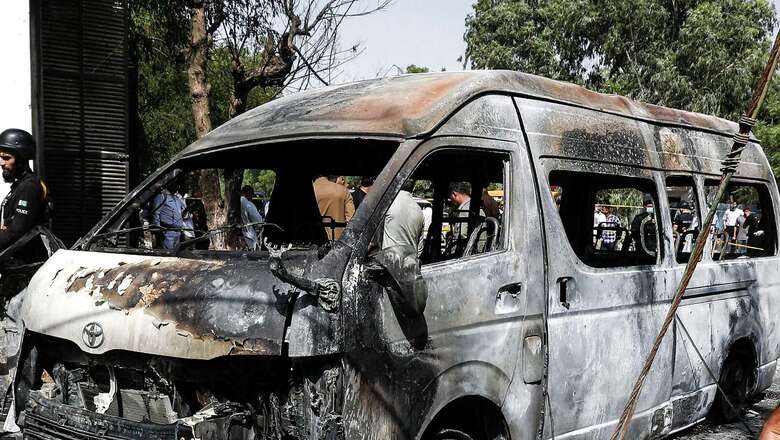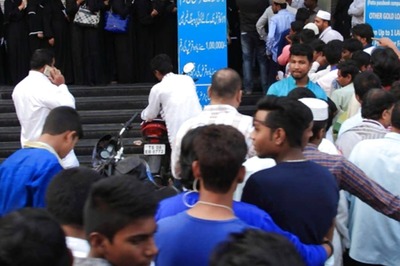
views
The best laid plans of men and mice (and in the instant case, of military men and their mujahideen allies) often go awry. Nowhere does this pithy observation holds true than in the AfPak region. For two long decades, Pakistan successfully played a double-game with the US-led international coalition that was engaged in stabilising and securing Afghanistan. While ostensibly Pakistan was a frontline ally in the War on Terror (and received tens of billions of dollars for its ‘service’), it was at the same time propping up, protecting and providing all forms of assistance to the Taliban terrorists and their associates.
For both Pakistan and Taliban there was a convergence of interest. The Taliban had their back to the wall and needed Pakistan’s support for coming back into the game. This was in spite of the fact that the Pakistanis had treacherously ditched the Taliban after 9/11 and had backed the US invasion that ousted their regime. It was also in spite of the fact that during the two decades that Pakistan supported the Taliban insurgency, many atrocities and indignities were heaped on the Taliban by the Pakistani intelligence agencies.
For their part, the Pakistanis needed the Taliban who they saw as their only allies in Afghanistan. Simply put, the Pakistanis believed that Taliban was a strategic necessity for which it was ready to defy the US-led international coalition. The Pakistanis convinced themselves that the Taliban would be beholden to them and would never allow any anti-Pakistan activity from Afghanistan. What is more, they would follow Pakistan’s lead on the issue of connectivity to West and Central Asia.
On paper, therefore, the Taliban victory in Afghanistan was seen as a huge strategic victory for Pakistan. Naturally, there was a lot of crowing and celebration in Pakistan after the Taliban occupied Kabul and declared their Emirate. But the celebrations were quite short-lived. Within days of the Taliban coming into power, it became clear that all the assumptions of the Pakistanis were proving false. In the nine months since the Taliban re-occupied Afghanistan, the security situation in Pakistan has deteriorated alarmingly. Not only is there a resurgence in the attacks of the Tehrik-e-Taliban Pakistan (TTP) but there is also a major uptick in the attacks by Baloch freedom fighters. As if this was not enough, the Islamic State chapters – Khorasan and the Pakistan – have also become very active.
ALSO READ | In Taliban-ruled Afghanistan, Strategic Depth Remains an Illusion for Pakistan’s ISI
In just the first three months of 2022, nearly 350 people have been killed in terrorist attacks in Pakistan. Over a 100 security force personnel have been killed in ambushes, clashes and targeted attacks in the first quarter of this year. Cross-border attacks by TTP fighters have become a norm. Clashes with Taliban border guards have also become a routine affair. Inside Pakistan, the TTP has been claiming around 40 attacks a month on average. These include sniper attacks, ambushes, IED blasts, targeted killings, attacks on posts and convoys.
Meanwhile, the Islamic State activities have also seen a spike. The bombing of a Shia mosque in Peshawar that killed more than 60 people was the most horrific, if also sensational, attack by the IS. But there are reports of target killings of cops not just in Khyber Pakhtunkhwa province but also Islamabad. There are claims of an attack in Sheikhupura in Punjab. The IS Pakistan chapter is also targeting religious clerics from the Jamiat Ulema-e-Islam (JUI) whom it considers as going against the faith. Alongside the actions of the Islamist terror groups, there has been a big uptick in the attacks by Baloch separatist groups. The ‘fidayeen’ type attacks in Panjgur and Noshki, and the latest suicide bombing by a highly educated Baloch woman in Karachi targeting Chinese scholars/teachers have sent shock waves throughout Pakistan.
What is extremely worrying for Pakistan is that there is an increasing sophistication in the type of attacks being launched. Many of these attacks are not simple hit-and-run type actions but complex operations. In addition, the equipment that is being used is acting like a force multiplier. A lot of these are the weapons left by the withdrawing US troops. Equally worrying is the fact that these ideologically disparate groups seem to have struck a sort of tactical alliance with each other. As a result, there is a lot of exchange in terms of support and techniques and tactics of terror. The ISKP (Islamic State – Khorasan Province), which has been viscerally opposed to other armed groups like Taliban and Al Qaeda, has never really targeted either the TTP or the Baloch freedom fighters. Even the Al Qaeda is believed to have a soft spot for the Baloch groups. While these groups may target each other in future, for now they have a common enemy in Pakistan.
But more than anything else, the greatest worry for Pakistan is the fact that the Taliban regime in Afghanistan has taken virtually no action against the groups targeting Pakistan. The belief that once Taliban are back in power, they will put the TTP and the Baloch freedom fighters out of business has been shattered by the ambivalent stance of the Taliban. Not only have the Taliban not taken any offensive action against any of the terrorist groups aligned with them, they have given protection to many of these groups, and allowed them to operate unhindered. Just like Pakistan provided strategic depth to the Taliban when the latter was fighting the US-led international coalition, today the Taliban Emirate is providing strategic depth to the TTP and the Baloch in their fight against the Pakistani state. Taking a leaf out of the Pakistani playbook for dealing with US demands to ‘do more’, the Taliban have flatly denied any presence of the TTP inside Afghanistan.
ALSO READ | Not Clashes along Durand Line, It is the TTP Factor That Can Poison Taliban-Pakistan Ties
There are a number of reasons why the Taliban are not going to move against the militants operating against Pakistan. One, the Taliban have experienced Pakistani treachery and don’t trust them. They will therefore like to keep some leverages over the Pakistanis. Two, the Taliban want to dispel the impression that they are Pakistani puppets. Within Taliban there are those beholden to Pakistan – the Haqqanis, for instance – and there are those who have a visceral dislike for the treatment meted out to them by the Pakistanis. By standing up to Pakistani demands, the Taliban regime is papering over its own fault-lines and also convincing not just the rank and file (which isn’t fond of Pakistan) but also people at large that they are first and foremost Afghans. Three, the TTP is born from the same womb as the Afghan Taliban. Ideologically and ethnically they are two sides of the same coin.
Four, the TTP gave sanctuary and support during the worst times to the Afghan Taliban. They fought with the Afghan Taliban and have sworn fealty to them. They have often functioned as a phalanx of the Afghan Taliban who cannot dump them just like that. Five, the Afghan Taliban claim that any precipitate action against the TTP will push them in the waiting arms of the ISKP which will be a disaster for them. This is the same logic that the Pakistanis used with the Americans to not act against the Afghan Taliban shuras inside Pakistan. Finally, the Afghan Taliban have serious problems of their own. They are facing not just the ISKP which is drawing blood on a daily basis and undermining Taliban claim of having restored order and peace in Afghanistan, but are also facing the first stirrings of resistance from the National Resistance Front (NRF). The last thing the Taliban need is to see their enemies close ranks against them.
The Taliban dilemma is that they desperately need to engage with the international community. For this they will need to dilute their ideological programme. But the moment they do that, it will drive the puritans away and open Taliban to charge of kowtowing to the infidels. The Pakistani dilemma is that if it doesn’t take any unilateral action against groups operating from Afghanistan, it will only strengthen them and allow space to them inside Pakistan; if it takes unilateral action, like it did when it launched airstrikes against TTP targets inside Afghanistan, it will lead to a storm of protests from the Taliban. The Taliban defence minister Mullah Yaqoob has already issued a stiff warning to Pakistan to desist from any attacks inside Afghanistan or else be ready for retaliation.
But Pakistanis have been carrying covert operations in Afghanistan for sometime now. Assassinations of TTP commanders and targeting of some Baloch movement leaders are believed to be part of Pakistani covert operations. The problem is that these operations have only steeled the resolve of the anti-Pakistan forces. Worse, they are raising hackles inside Afghanistan and it won’t be long before the Taliban hit back using their own proxies.
Clearly, as things stand, Pakistan’s grand strategic plans that were based on its Afghan policy have started to come unstuck. The Taliban regime in Afghanistan is not turning out to be what was expected. With a collapsing economy and rising discontent inside Pakistan, the wave of terrorism that is now emanating once again from Afghanistan will only add to the existential crisis confronting it. And this time, there is no India or the US to blame.
Sushant Sareen is a Senior Fellow at the Observer Research Foundation. The views expressed in this article are those of the author and do not represent the stand of this publication.
Read all the Latest Opinions here

















Comments
0 comment